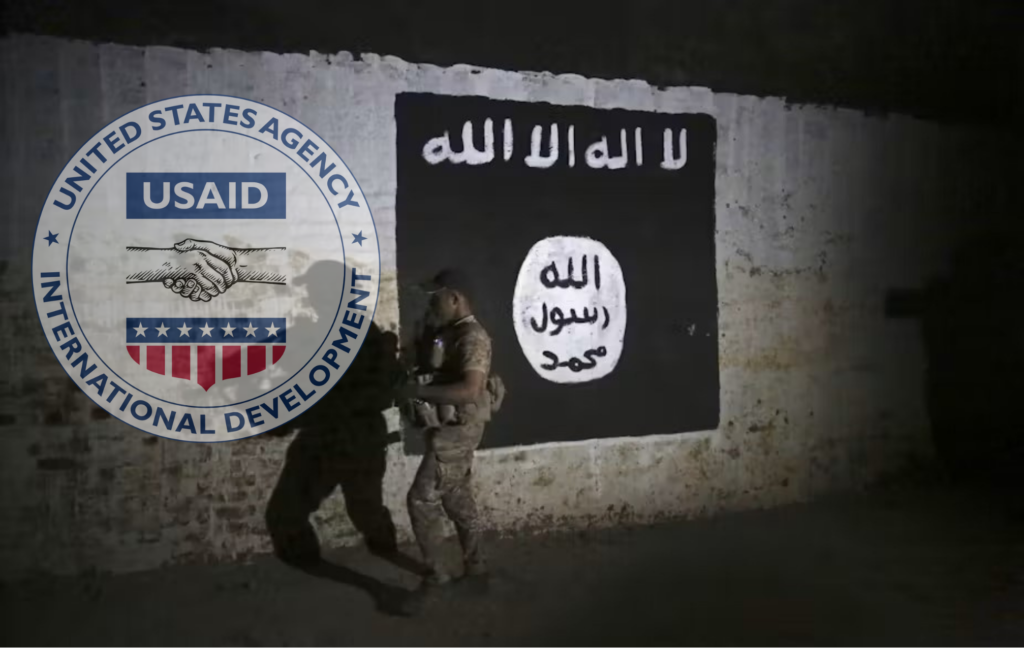
USAID- The Trump administration’s attempts to dismantle USAID and halt foreign aid have significantly weakened oversight, sparking concerns that US taxpayer funds might unintentionally support terrorist groups.

A watchdog report points to staff cuts and suspended vetting procedures, putting billions in aid at risk of going unmonitored. Previous instances suggest that USAID funds have allegedly aided extremist organizations.
The Trump administration’s decision to dismantle USAID and impose a broad freeze on foreign aid has severely undermined the agency’s ability to oversee and regulate humanitarian assistance, sparking concerns that taxpayer-funded aid could inadvertently support terrorist organizations.
A recent report from USAID’s Office of the Inspector General (OIG) indicates that these cuts have hindered efforts to monitor the proper allocation of funds, increasing the risk of them reaching extremist groups.
The OIG report highlights that although USAID has long struggled with preventing fraud, waste, and abuse, recent cuts to staff and oversight mechanisms have further weakened its capacity to protect humanitarian funds.
The report states that widespread staffing cuts across the agency, combined with uncertainty surrounding foreign assistance waivers and allowable communication with implementers, have weakened USAID’s ability to distribute and protect taxpayer-funded humanitarian aid.
US President Donald Trump and Elon Musk have defended the dismantling of USAID as a measure to curb fraud and mismanagement. However, the report indicates that this action has instead had the opposite effect, diminishing the agency’s capacity for oversight.
Unmonitored USAID: Amount in Billions
The OIG report emphasizes that USAID’s Bureau for Humanitarian Assistance (BHA) has been among the most severely affected divisions, with over 90% of its global workforce either furloughed or placed on administrative leave.

As a result, vetting processes intended to prevent US foreign aid from reaching extremist groups such as Hamas, Hezbollah, ISIS, and the Houthis have effectively come to a standstill.
Countries that mandate rigorous partner vetting, such as Afghanistan, Iraq, Lebanon, Pakistan, Syria, the West Bank and Gaza, and Yemen, have experienced a substantial reduction in oversight due to USAID’s staffing cuts.
The report notes that while USAID OIG had previously identified gaps in partner vetting, agency staff have indicated that the counter-terrorism vetting unit responsible for overseeing humanitarian aid programs was recently instructed not to report to work, rendering it unable to carry out partner vetting.
Furthermore, third-party monitoring, which is essential for overseeing aid distribution in conflict zones like Ukraine, Afghanistan, Ethiopia, Haiti, Gaza, Iraq, Lebanon, Somalia, Syria, and Venezuela, has been put on hold.
The report cautions that without third-party oversight, the proper allocation of foreign aid is at significant risk, as previous monitoring systems are now “largely non-operational” due to recent directives and staffing decisions.
Previous USAID tied to terrorism:
Concerns over USAID’s oversight are well-founded, as past cases have shown instances where its funds were linked to terrorist activities.
One notable example, reported by Fox News, involves Anwar al-Awlaki, an American-born al-Qaeda operative who received full funding from USAID to attend Colorado State University.
Al-Awlaki, who was later killed in a drone strike in 2011, was a key figure in radicalization efforts and had direct ties to the 2009 Fort Hood shooting and the attempted bombing of a US-bound flight on Christmas Day.
Records show that al-Awlaki fraudulently claimed Yemeni nationality to qualify for USAID funding, and the agency approved his scholarship despite the false information.
More recently, USAID has been linked to financing the Pakistan-based Falah-e-Insaniat Foundation (FIF), a front for the banned terrorist group Lashkar-e-Taiba (LeT), according to a report by India Today.
LeT was responsible for the 2008 Mumbai terror attacks, which killed 166 people, including six Americans. Despite FIF being designated a terrorist organization by the US government in 2010, USAID funds were routed to the group through Helping Hand for Relief and Development (HHRD), a Michigan-based charity with alleged ties to extremist organizations in South Asia.
In 2019, three U.S. lawmakers formally called on the State Department to investigate these funding connections, raising concerns that taxpayer money was being used to support terrorist activities.
Despite these warnings, the funding persisted, with USAID allocating an additional $73,000 to HHRD in 2023 under the Biden administration, despite previous concerns about its ties to extremist groups.
Effects of USAID’s dismantling
Supporters of the move argue that it is necessary to eliminate inefficiencies and prevent fraud, while critics caution that reduced oversight increases the risk of aid being misused.
Trump’s actions reflect his broader “America First” policy, which prioritizes domestic issues over foreign aid. His administration has maintained that USAID funding has frequently been mismanaged and allocated to unworthy causes.

However, the OIG report challenges these claims, asserting that dismantling USAID has left billions of dollars in humanitarian assistance unspent and without adequate oversight.
Beyond suspending aid programs, the freeze has also created uncertainty regarding the scope of waivers for life-saving humanitarian assistance. Although U.S. Secretary of State Marco Rubio granted exemptions for critical aid, reports from aid organizations and UN officials indicate that most programs remain stalled.
This has disrupted critical relief efforts in conflict-ridden and disaster-affected regions, where timely aid is crucial.
The Norwegian Refugee Council, a leading humanitarian organization, described the U.S. aid suspension as the most severe in its 79-year history. On Monday, it announced that the decision would compel it to halt programs assisting hundreds of thousands of people across 20 countries.
“The impact of this will be felt most severely by the most vulnerable—from deeply neglected Burkina Faso, where we are the sole provider of clean water for 300,000 people trapped in the blockaded city of Djibo, to war-torn Sudan, where we support nearly 500 bakeries in Darfur that supply daily subsidized bread to hundreds of thousands suffering from hunger,” the organization stated.
Additionally, USAID’s staffing crisis has further hampered its ability to investigate allegations of fraud and mismanagement.
The report states that uncertainties regarding the scope of waivers, the extent of allowable communication between USAID staff and aid organizations, the abrupt termination of contract employees, and the placement of staff on paid administrative leave have all restricted BHA’s capacity to receive and address allegations of fraud, waste, abuse, or the misallocation of humanitarian aid.
You can also read
You can follow us on social media platforms




2 thoughts on “Could USAID reductions cause U.S. tax dollars to finance terrorist groups?”